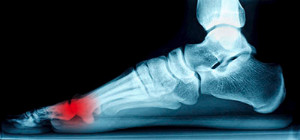NJ (908) 688-5577
NY (212) 737-2528
 The bones that are located at the bottom of the big toe are referred to as sesamoid bones. They lie between the tendons of this toe, and pain and discomfort may be caused if inflammation occurs. This can happen as a result of overuse or if a sudden injury happens. Some of the symptoms that are associated with sesamoiditis often include pain while the big toe is pulled upward, and walking may be difficult when weight is placed on the foot. Once a diagnosis is performed, which includes having an X-ray or MRI taken, treatment can begin. It is helpful to wear shoes that provide adequate cushioning, in addition to wearing custom orthotics. If you feel you have sesamoiditis, it is suggested that you schedule a consultation with a podiatrist who can properly treat this condition.
The bones that are located at the bottom of the big toe are referred to as sesamoid bones. They lie between the tendons of this toe, and pain and discomfort may be caused if inflammation occurs. This can happen as a result of overuse or if a sudden injury happens. Some of the symptoms that are associated with sesamoiditis often include pain while the big toe is pulled upward, and walking may be difficult when weight is placed on the foot. Once a diagnosis is performed, which includes having an X-ray or MRI taken, treatment can begin. It is helpful to wear shoes that provide adequate cushioning, in addition to wearing custom orthotics. If you feel you have sesamoiditis, it is suggested that you schedule a consultation with a podiatrist who can properly treat this condition.
Sesamoiditis is an unpleasant foot condition characterized by pain in the balls of the feet. If you think you’re struggling with sesamoiditis, contact Glenn Davison, DPM of Advanced Podiatry. Our doctor will treat your condition thoroughly and effectively.
Sesamoiditis
Sesamoiditis is a condition of the foot that affects the ball of the foot. It is more common in younger people than it is in older people. It can also occur with people who have begun a new exercise program, since their bodies are adjusting to the new physical regimen. Pain may also be caused by the inflammation of tendons surrounding the bones. It is important to seek treatment in its early stages because if you ignore the pain, this condition can lead to more serious problems such as severe irritation and bone fractures.
Causes of Sesamoiditis
Treatment for sesamoiditis is non-invasive and simple. Doctors may recommend a strict rest period where the patient forgoes most physical activity. This will help give the patient time to heal their feet through limited activity. For serious cases, it is best to speak with your doctor to determine a treatment option that will help your specific needs.
If you have any questions please feel free to contact our offices located in Union, NJ and New York . We offer the newest diagnostic and treatment technologies for all your foot and ankle needs.